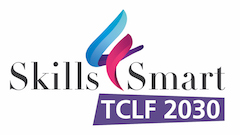FOSTERING TEXTILE ACADEMIA-INDUSTRY COLLABORATION FOR TEXTILE AND LEATHER INDUSTRIES : EXAMPLES FROM ERASMUS+ PROJECTS
Relationships between academia and industry are very important for all the industrial sectors and particularly on the TCLF. A good connection between industry and academia can create the necessary synergies to create innovations, to revise the curricula and adapt them to the needs of the industry, to promote the education centers as focal points in the TCLFs industries, and to promote entrepreneurial activities among the students to contribute as catalysts of innovation for TCLF sectors, among others. It is then of crucial importance to fulfill the knowledge triangle, bringing together industry, academia, and research, and create an ecosystem including all actors involved in TCLF sectors.
Some examples fostering textile academia-industry collaboration in the framework of the Erasmus + Capacity Building Program are FOSTEX and WINTEX for the Textile Industry and INNOLEA for the Leather Industry.
FOSTEX Fostering innovation in the Jordanian and Moroccan textile industry
This project is a Capacity-building project that supports the modernization, accessibility, and internationalization of higher education in Jordan in Morocco.
The activities of the project included firstly a field & Desk research to identify the textile industrial needs of Morocco and Jordan and, in combination with EU Best practices to prepare a cross-country report. The second step was to train the staff and equip the laboratories, define the de services and the transfer to be made from academia to industry, and disseminate and discuss it with the industry through roundtables. Moreover, a business plan will help to ensure the management of the academia-industry collaboration. Finally, a collaboration platform & network will be created and an Entrepreneurship and innovation plan will be developed to ensure the sustainability of the continuity of the project. (Figure 1).
Figure 1. Steps of the FOSTEX Erasmus + Project.
For the correct development of the project, it is important to count on a consortium formed by a mixture of institutions with different profiles, capacities, and complementary competencies –education institutions, companies, and non-profit institutions, research and training centres, and business associations among others –. This transversal representation and involvement of all relevant stakeholders of the Textile sector will guarantee the sustainability of the project. More information can be found at https://fostexproject.eu
In a similar way, WINTEX project aims to fill the gap in the area of specialized services for the Tunisian textile sector with the establishment of three innovation textile centers located at the participating Universities in Tunisia: the University of Sfax, University of Monastir, and the Higher Institute of Technological Studies of Ksar Hellal-ISET. The project promotes the collaboration between the participating European organizations and the ones in Tunisia, by creating a network, which may benefit the textile industry in the countries involved in the project. WINTEX implement activities involving the capacity building of staff, equipping centers, promoting the knowledge transfer between academia and the industry. This project will help to create an efficient Tunisian textile ecosystem including academia.
On the other hand, INNOLEA project aims to promote academia-industry collaboration but in the Leather sector. In the framework of this project, the leather sectors in Jordan and Egypt will be offered access to business development services, such as quality testing, product certification, training, fashion trends, production organization, B2B, and funding opportunities promoted from academic centers.
The project aims to create and maintain a link between higher education institutions and businesses of the leather sector that will foster innovation and the manufacturing of high-value quality products, as well as further cooperation between EU and Jordan and Egypt Universities and leather businesses.
These three examples can be easily transferred to other countries in Europe and clothing and footwear sectors, creating an ecosystem to foster academia-industry collaboration of the TCFL sectors.


